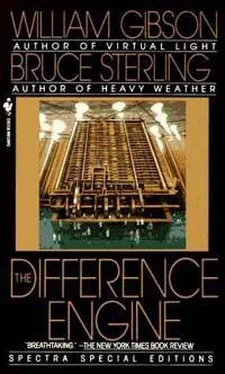William Gibson - The Difference Engine
Здесь есть возможность читать онлайн «William Gibson - The Difference Engine» весь текст электронной книги совершенно бесплатно (целиком полную версию без сокращений). В некоторых случаях можно слушать аудио, скачать через торрент в формате fb2 и присутствует краткое содержание. Жанр: sf_cyber_punk, fantasy_alt_hist, на английском языке. Описание произведения, (предисловие) а так же отзывы посетителей доступны на портале библиотеки ЛибКат.
- Название:The Difference Engine
- Автор:
- Жанр:
- Год:неизвестен
- ISBN:нет данных
- Рейтинг книги:3 / 5. Голосов: 1
-
Избранное:Добавить в избранное
- Отзывы:
-
Ваша оценка:
- 60
- 1
- 2
- 3
- 4
- 5
The Difference Engine: краткое содержание, описание и аннотация
Предлагаем к чтению аннотацию, описание, краткое содержание или предисловие (зависит от того, что написал сам автор книги «The Difference Engine»). Если вы не нашли необходимую информацию о книге — напишите в комментариях, мы постараемся отыскать её.
The Difference Engine — читать онлайн бесплатно полную книгу (весь текст) целиком
Ниже представлен текст книги, разбитый по страницам. Система сохранения места последней прочитанной страницы, позволяет с удобством читать онлайн бесплатно книгу «The Difference Engine», без необходимости каждый раз заново искать на чём Вы остановились. Поставьте закладку, и сможете в любой момент перейти на страницу, на которой закончили чтение.
Интервал:
Закладка:
Someone clapped him firmly on the back. He turned, expecting Tom or Brian, and found the Marquess there.
"Are you quite all right?"
"A passing fit," Mallory croaked. He waved one hand, unable to straighten.
The Marquess slipped a curved silver flask into his hand. "Here," he said. "This will help."
Mallory, expecting brandy, tilled the flask to his lips. A treacly concoction, tasting vaguely of licorice and elm, flooded his mouth. He swallowed reluctantly. "What—what is this?"
"One of Dr. Barton's herbal remedies," the Marquess told him, "a specific against the foetor. Here, let me soak your mask in it; the fumes will clear your lungs."
"I'd rather you didn't," Mallory rasped.
"Are you fit then to return to the lecture?"
"No! No."
The Marquess looked skeptical. "Dr. Barton is a medical genius! She was the first woman ever to graduate with honors from Heidelberg. If you knew the wonders she's worked among the sick in France, the poor wretches given up for dead by the so-called experts—"
"I know," Mallory blurted. Something like strength returned to him, and with it a strong urge to throttle the Marquess, shake this damned and dangerous little fool till the nonsense squeezed out of him like paste. He felt a suicidal urge to blurt out the truth, that he knew this Barton to be a poisoner, an adulteress, a vitrioleuse, wanted by police in at least two countries. He could whisper that confession, then kill the Marquess of Hastings and stuff his wretched body under something.
The fit left him, replaced with a rational cunning cold and brittle as ice. "I should rather talk with you, comrade," said Mallory, "than listen to any lecture."
"Really?" said Hastings, brightening.
Mallory nodded earnestly. "I… I find I always profit by listening to a man who truly knows his business."
"I cannot make you out, comrade," the Marquess said. "Sometimes you seem to me a typical self-seeking fool, but then again you seem a man of quite sophisticated understanding—certainly a cut above those friends of yours!"
"I've traveled a bit," Mallory said slowly. "I suppose it broadens a man."
"Traveled where, comrade?"
Mallory shrugged. "Argentina. Canada. On the Continent, here and there."
The Marquess glanced about them, as if looking for spies a-lurk in the birdbaths and chandeliers. When none showed, he seemed to relax a bit, then spoke with a renewed but quiet urgency. "Might you know the American South at all? The Confederacy?"
Mallory shook his head.
"There's a city called Charleston, in South Carolina. A charming town. It has a large community of well-born British exiles, who fled the Rads. Britain's ruined cavaliers."
"Very nice," Mallory grunted.
"Charleston is as refined and cultured a city as any in Britain."
"And you were born there, eh?" Mallory had blundered to speak this deduction aloud, for Hastings was sensitive about it, and frowned. Mallory hastened on. "You must have prospered in Charleston, to own a Negro."
"I do hope you are not an anti-slavery bigot," the Marquess said. "So many Britons are. I suppose you would have me pack poor Jupiter off to one of those fever-ridden jungles in Liberia!"
Mallory restrained his nod of agreement. He was in fact an abolitionist, and a supporter of Negro repatriation.
"Poor Jupiter wouldn't last a day in the Liberian Empire," the Marquess insisted. "Do you know he can read and write? I myself taught him. He even reads poetry."
"Your Negro reads verse?"
"Not 'verse'—poesy. The great poets. John Milton—but you've never heard of him, I wager."
"One of Cromwell's ministers," Mallory said readily, "author of the 'Areopagitica'."
The Marquess nodded. He seemed pleased. "John Milton wrote an epic poem, 'Paradise Lost'. It's a Biblical story, in blank verse."
"I'm an agnostic myself," Mallory said.
"Do you know the name of William Blake? He wrote and illustrated his own books of poems."
"Couldn't find a proper publisher, eh?"
"There are still fine poets in England. Did you ever hear of John Wilson Croker? Winthrop Mackworth Praed? Bryan Waller Procter?"
"I might have," Mallory said. "I read a bit—penny-dreadfuls, mostly." He was puzzled by the Marquess's strange interest in this arcane topic. And Mallory was worried about Tom and the others—what they must be thinking as they sat and waited for him. They might lose all patience and try something rash, and that wouldn't do.
"Percy Bysshe Shelley was a poet, before he led the Luddites in the Time of Troubles," the Marquess said. "Know that Percy Shelley lives! Byron exiled him to the island of St. Helena. He remains a prisoner there, in the manse of Napoleon the First. Some say he's since written whole books of plays and sonnets there."
"Nonsense," Mallory said, "Shelley died in prison ages ago."
"He lives," the Marquess said. "Not many know that."
"Next you'll be saying that Charles Babbage wrote poetry," Mallory said, his nerves raw. "What's the point of this?"
"It's a theory of mine," the Marquess said. "Not so much a proper theory, as a poetic intuition. But since studying the writings of Karl Marx—and of course the great William Collins—it has come to me that some dire violence has been done to the true and natural course of historical development." The Marquess paused, smirked. "But I doubt you can understand me, my poor fellow!"
Mallory shook his head roughly. "I understand well enough. A Catastrophe, you mean."
"Yes. You might well call it that."
"History works by Catastrophe! It's the way of the world, the only way there is, has been, or ever will be. There is no history—there is only contingency!"
The Marquess's composure shattered. "You're a liar!"
Mallory felt the foolish insult gall him to the quick. "Your head's full of phantoms, boy! 'History'! You think you should have a title and estates and I should rot in Lewes making hats. There's nothing more to it than that! You little fool, the Rads don't care tuppence for you or Marx or Collins or any of your poetic mummeries! They'll kill the lot of you here like rats in a sawdust pit."
"You're not what you seem," the Marquess said. He had gone as white as paper. "Who are you? What are you?"
Mallory tensed.
The boy's eyes widened. "A spy." He went for his gun.
Mallory punched him full in the face. As the Marquess reeled back, Mallory caught his arm and clubbed him, once, twice, across the head, with the heavy barrel of the Ballester-Molina. The Marquess fell bleeding.
Mallory snatched up the second pistol, rose, glanced about him.
The Negro stood not five yards away.
"I saw that," Jupiter said quietly.
Mallory was silent. He leveled both guns at the man.
"You struck my master. Have you killed him?"
"I think not," Mallory said.
The Negro nodded. He spread his open palms, gently, a gesture like a blessing. "You were right, sir, and he was quite wrong. There is nothing to history. No progress, no justice. There is nothing but random horror."
"That's as may be," Mallory said slowly, "but if you cry out I will have to shoot you."
"If you had killed him, I should have certainly cried out," the Negro said.
Mallory glanced back. "He's still breathing."
There was a long silence. The Negro stood quite still, his posture stiff and perfect, undecided, unmoving, like a Platonic cone balanced perfectly upon its needle tip, waiting for some impetus beyond causality to determine the direction of its fall.
The Negro sighed. "I'm going back to New York City, " he said. He turned on one polished heel and walked away, unhurried, vanishing into the looming barricades of goods.
Mallory felt quite certain that the man would not cry out, but he waited a few moments for the evidence that would confirm that belief. The Marquess stirred where he lay, and groaned. Mallory whipped the paisley kerchief from the man's curly head and gagged him with it.
Читать дальшеИнтервал:
Закладка:
Похожие книги на «The Difference Engine»
Представляем Вашему вниманию похожие книги на «The Difference Engine» списком для выбора. Мы отобрали схожую по названию и смыслу литературу в надежде предоставить читателям больше вариантов отыскать новые, интересные, ещё непрочитанные произведения.
Обсуждение, отзывы о книге «The Difference Engine» и просто собственные мнения читателей. Оставьте ваши комментарии, напишите, что Вы думаете о произведении, его смысле или главных героях. Укажите что конкретно понравилось, а что нет, и почему Вы так считаете.









